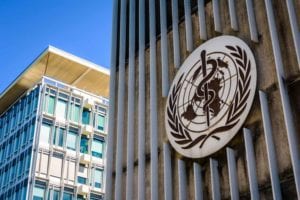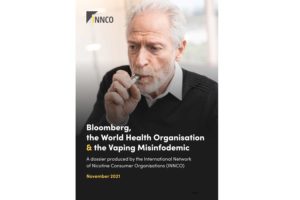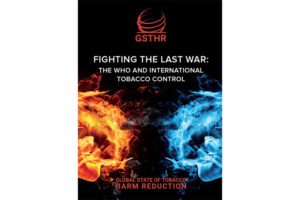
The FCTC COPs comprise a counterproductive, environment-busting waste of time and money.
By George Gay
If COP10 proved one thing, it is that there should be no COP11.
The continuing existence of the Conference of the Parties (COP) to the World Health Organization Framework Convention on Tobacco Control (FCTC), which is seemingly controlled by a coterie of authoritarian, publicity-shy, self-appointed morality overseers and to which supposedly sovereign governments humbly send their delegates to worship at the altar of the FCTC Secretariat, is an affront to the environment and to the taxpayers who part fund these COP affairs and whose taxes could be better spent feeding and otherwise providing for people currently in desperate need.
From the information that seeps out, everything that gets done at these secretive affairs could be done through emails and the odd telephone call. It seems unconscionable, verging on suicidal, that, with 2023 having marked the first time that every day within a year, the temperature exceeded 1 degree Celsius above the 1850–1900 preindustrial level, with close to 50 percent of days 1.5 degrees above and two days in November, for the first time, more than 2 degrees above,* more than 1,000 COP delegates should kick off 2024 by flying to Panama supposedly as part of a health initiative. This was insanity on stilts.
I asked the organizers what the carbon footprint of the event was, but answer came there none, so one must assume that while the secretariat likes to interest itself in the environmental impact of tobacco, it is unconcerned about keeping its own house in order. In other words, it is safe to assume that COP10 was a totally avoidable environmental disaster waved through so a few people could carry forward a vanity project aimed at their trying to interfere with the lifestyle choices of smokers.
Why should the diktats dreamed up by a tiny clique of would-be tobacco prohibitionists and lifestyle controllers be allowed to affect the choices of 1 billion adult smokers?
Limiting Choices and Threatening Livelihoods
Why should the diktats dreamed up by a tiny clique of would-be tobacco prohibitionists and lifestyle controllers be allowed to affect the choices of 1 billion adult smokers? Why should they be allowed to threaten the livelihoods of millions of tobacco growers, their families and those who work for tobacco companies and allied businesses?
The futility of COP10 was nicely, though unintentionally, summed up by one of the European Union delegates when, in his three-minute introductory slot, he said that the EU had been at the forefront of tobacco control and a driving force in negotiating the FCTC and its protocols, now an important component of the 2030 agenda for Sustainable Development (SD). Then, without offering any reason or apportioning any blame, he said that at the midway point of the 2030 SD agenda, 85 percent of the SD goals were off track and that nearly a third of the targets were in regression. Turning to the home front, he said that despite the introduction of tobacco control legislation and policies, smoking rates in the EU remained high, again without questioning why this might be the case.
Meanwhile, seemingly oblivious to the failures he had described, the delegate started to sum up by talking of the need to redouble joint efforts by saying that the EU remained fully committed to the FCTC and adding that by working together during the conference, delegates could take a step forward in their global tobacco control agenda. At first, I thought the delegate had taken as advice Walt Kelly’s put-down, “having lost sight of our objectives, we redoubled our efforts.” But then I realized this was not true because whereas I had assumed the main objective was to encourage people to quit tobacco smoking, the EU delegate’s objective was seemingly to implement WHO measures whether they worked or not.
He finished by saying, “Together, we can deliver sustainable progress and pave the way for a tobacco-free world where people can enjoy healthy lives with no one left behind.” Here we were into Candide territory where everything is for the best in the best of all possible worlds. Fortunately, the Ukraine delegate was there to remind delegates that this was not the best of all possible worlds and that tobacco consumption goes up when people are under stress, especially when they are constantly under the threat of death because their territory has been invaded by the forces of another country.
Whereas I had assumed the main objective was to encourage people to quit tobacco smoking, the EU delegate’s objective was seemingly to implement WHO measures whether they worked or not.
No Progress Without Change
Do the WHO and the delegates at these affairs really believe that by trying to force people to give up tobacco smoking, they will ensure everybody leads a healthy life, with no one left behind? What about the many people around the world daily facing rape, torture and violent death by invading forces or simply at the hands of their own less than benevolent governments? Will the multitudes afflicted by under-reported starvation, with their dying words, thank the delegates for saving them from the ills of tobacco? Will those vulnerable people deeply afraid of the arrival, on the WHO’s watch, of the next pandemic, offer thanks for being protected from a lifestyle choice they can protect themselves from? And do these delegates think that when we are all standing knee-deep in water following environmental breakdown, we shall thank them for removing the temptation of smoking, if for no other reason than because the matches would be too damp to light our tobacco? If they do, they need to get out more.
And they need to mend their bullying ways. One of the main reasons why there should be no COP11 is down to the disrespectful way the COP10 affair treated the Philippines. Apparently, the Global Alliance on Tobacco Control (GATC), previously known as the Framework Convention Alliance, in a puerile intervention in what should have been an adult debate, handed the country the GATC’s pathetic “Dirty Ashtray” award for having the temerity to promote tobacco harm reduction (THR). The Philippines is a sovereign democracy that decided after robust debate that the health of its people could be aided by allowing smokers access to safer alternatives to combustible cigarettes. It should continue along that path unless it, and it alone, decides otherwise. Its decisions should not be brought into question by a gaggle of anti-tobacco organizations whose existence is dependent on the continuing health of the tobacco industry but that is threatened by the rise of THR.
Indeed, the FCTC Secretariat and the GATC should, in any properly run debate, recuse themselves when matters of THR are raised since they could be seen as having a vested interest in not wanting the tobacco industry, especially the cigarette industry, to be fatally undermined—rather than suffering the flesh wounds the FCTC is able to inflict. That this is the case is supported by the existence of the COP byproduct, the Meeting of the Parties (MOP3, as it was in Panama) to the Protocol to Eliminate Illicit Trade in Tobacco Products, whose love affair with “track-and-trace” systems is aimed at ensuring tobacco manufacturing businesses retain their customers.
The best reaction to the GATC’s intervention would be for all nations that are committed to THR to withdraw from the FCTC, which is not going to change its ideology. And without change, there can be no progress.
But for all COP10’s faults, I cannot help wondering whether hypocrisy isn’t the very worst. I would suggest that a significant proportion of the more than 1,000 delegates and officials who attended the Panama affair drink alcohol. And I would further suggest that a good proportion of those are addicted, or regular drinkers, some of whom might be “problem drinkers.” How, I wonder, do these drinkers manage to take the moral high ground and condemn smokers? Do they have to stand on their empties? Isn’t that a little unstable? Or perhaps they are used to such balancing acts. Perhaps they are used to using just one eye to examine the damage done to individuals by their smoking while shutting the one that might focus on the even greater damage done to populations and societies at large by drinking. Sadly, I doubt that many have the level of self-awareness that would encourage them to engage with such issues. They exist in a closed world of self-righteous indignation.
Although that is not the way the secretariat sees things. COP10 headlined a post-conference press note with possibly the longest heading ever written: “COP10 adopted historic decisions to protect the environment from the harms of tobacco and to address cross-border tobacco advertising, promotion and sponsorship and the depiction of tobacco in entertainment media.”
How any of the above warrants the epithet “historic” is beyond me. The idea that what went on in Panama Feb. 5–10 should be regarded as famous or important in history is simply laughable. From what has emerged, COP10 was just another case of the same people using a lot of words to say the same things as they have said in the past. The only way that COP10 could write itself into the history books would be to do the decent thing and write FCTC COPs out of history.
Shrouded in Secrecy
How do I know that the same people said the same things? I don’t; I’m guessing; I have to guess. WHO COPs are conducted along the lines of secret society meetings by people supposedly so frightened that anybody should learn of the lack of intellectual rigor guiding their processes that delegates are required to go through a type of omerta ceremony, though, bizarrely, they seem to refer to it as the application of Chatham House Rules. Journalists and anybody with an independent mindset are not allowed to enter the hallowed halls of the conference.
Or are they? According to the press note with the longest heading, “COP10 was open to the media ….” But this does not chime with report after report by journalists and other interested parties who have complained about not being granted accreditation at any of the FCTC COPs due to a standard FCTC cop-out. One of the best brief reports on COP10 that I read was by Nick Powell for EU Reporter, who wrote, “Like many journalists, I was refused accreditation, but that made little difference as the conference voted to exclude the press.”
It is difficult to square these two takes on the situation. I did ask the organizers of the event about this, but answer came there none. All I can go on is that the overwhelming evidence points to the fact that Powell is correct. And this is probably admitted in the full sentence in the press note with the longest heading: “COP10 was open to the media, which had the opportunity to observe all public and open sessions, enabling reporters to witness more than 1,000 delegates from around the world unite over six days to consider and take action on important issues related to implementation of the convention.” It seems that this was obfuscation because there were few “public” or “open” sessions. I must admit that they had me fooled there for a minute, but then I thought that press notes, even those with the longest headings, were supposed to inform, not mislead.
Silly me. Health Policy Watch (HPW), obviously having read another post-event press note, quoted the WHO as saying: “Globally, some 200,000 hectares of land are cleared every year for tobacco cultivation, accounting for up to 20 percent of the annual increase in greenhouse gasses (GHGs).” But, as HPW pointed out, the WHO “failed to explain the source for the GHG estimate.”
And it could do with explaining something else. This is from the thoughtful COP10 conclusions of the International Tobacco Growers’ Association (ITGA): “ITGA, as the global tobacco growers’ representatives, observes with concern the impunity applied to using arguments against tobacco farming without providing reliable data. A fresh example is the WHO FCTC claim that 200,000 hectares of land are being cleared every year to grow tobacco when in fact, the harvested area of tobacco has consistently declined in the last decade.”
COP10 was just another case of the same people using a lot of words to say the same things as they have said in the past.
Avoiding Harm Reduction
But let me go back to Powell’s piece because it contained something else most interesting. He immediately followed the sentence quoted above with one saying: “That was shortly after the organizers cut off the microphone of a delegate who had the temerity to suggest that the priority should be harm reduction.” Of course, this incident makes a mockery of the statement in the press note with the longest heading that is quoted above as saying 1,000 delegates from around the world were united over six days. Clearly, they were not united. Questions around THR and less risky alternatives to combustible cigarettes had to be kicked down the road.
Powell did not say which delegate was cut off so rudely, and I can imagine there might be any number who would have wanted to make the point about THR, including those from the Philippines, of course, but I do know the U.K. delegation was supposed to make such an intervention. A meeting in the U.K.’s Houses of Parliament on Jan. 18 was told by Dame Andrea Leadsom, the parliamentary undersecretary of state for health and social care, that the U.K. delegation to COP10 would put forward its position that vapes comprised an important tool for helping adults quit tobacco smoking.
Leadsom was speaking during a backbench debate organized by Member of Parliament Andrew Lewer and aimed at uncovering what stance the government would take at COP10. Lewer, and others who spoke during the debate, were concerned that COP10 might resolve to establish equivalence in the regulation of combustible cigarettes and reduced-risk products, thus undermining the U.K.’s successful strategy of using vapes to help smokers quit their habit. Concern was expressed during the debate also about the fact that though the U.K. was a major contributor to the FCTC, it seemed diffident in its approach to tobacco COPs.
If backbenchers were hoping for a robust stance by the U.K. this time around, they must have been disappointed, at least in respect of the three-minute introductory presentation by the U.K. delegate, who did not mention THR and whose reference to vapes was confined to saying how the U.K. was concentrating on reducing the appeal of these products to children. I could not see whether she tugged her forelock when she declared commitment to the FCTC.
What a contrast to the New Zealand delegate’s brilliantly measured presentation where she spoke of the country’s pride in reaching tobacco control milestones and coming close to its goal of reducing the incidence of smoking below 5 percent. This had been achieved, she added, through a mix of FCTC-endorsed measures and the considered implementation of evidence-based harm reduction measures, including making available to smokers a range of nicotine-replacement products.
The question is, why should these pointless events continue. Most governments run by sentient creatures must know that FCTC COPs comprise a counterproductive, environment-busting waste of time and money. Safer alternative products can replace combustible cigarettes within a reasonable time. All that is needed is for those governments to apply and enforce consistent, light-touch but effective regulation to these products, ensure that messaging about them aimed at consumers is accurate, clear and consistent, and then sit back and let the private sector do the rest.
The FCTC has already ruled itself out of being a part of such a process.
*Figures from the European Commission’s Copernicus project














